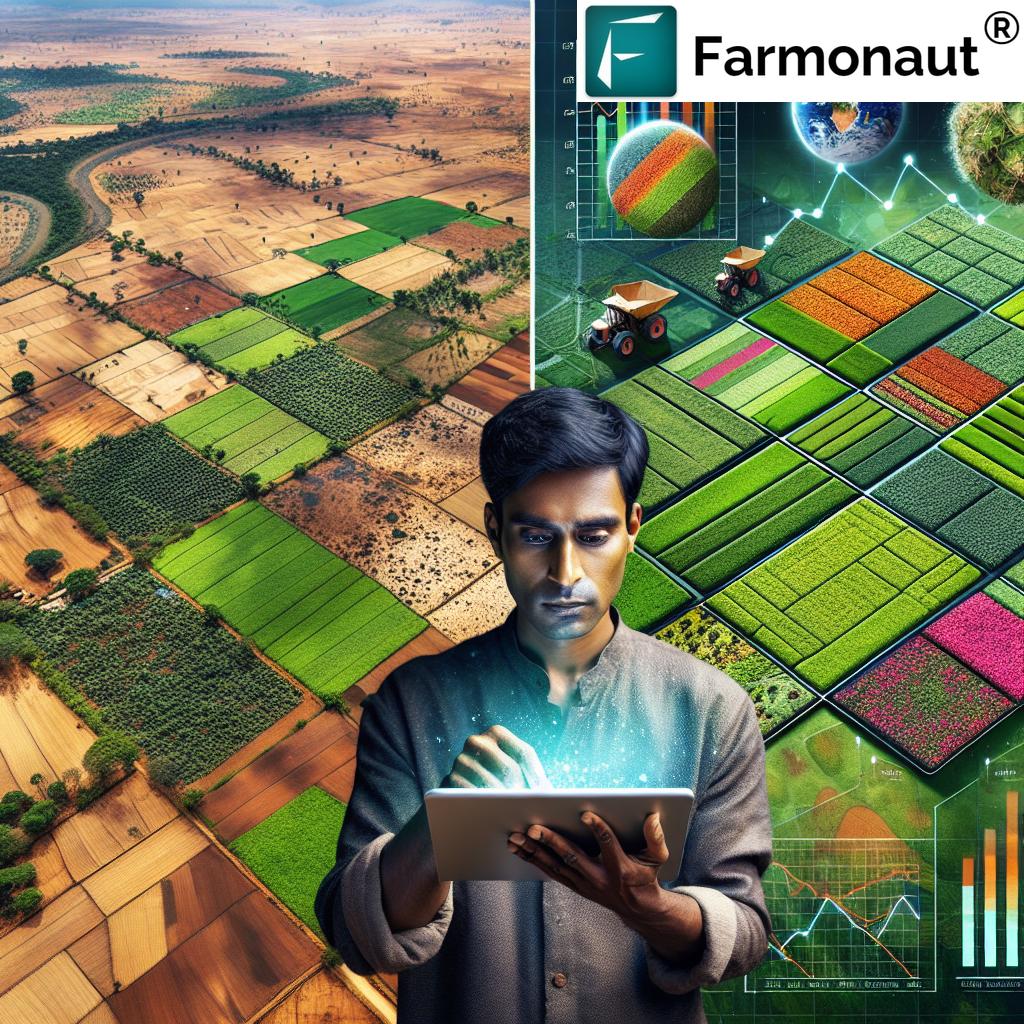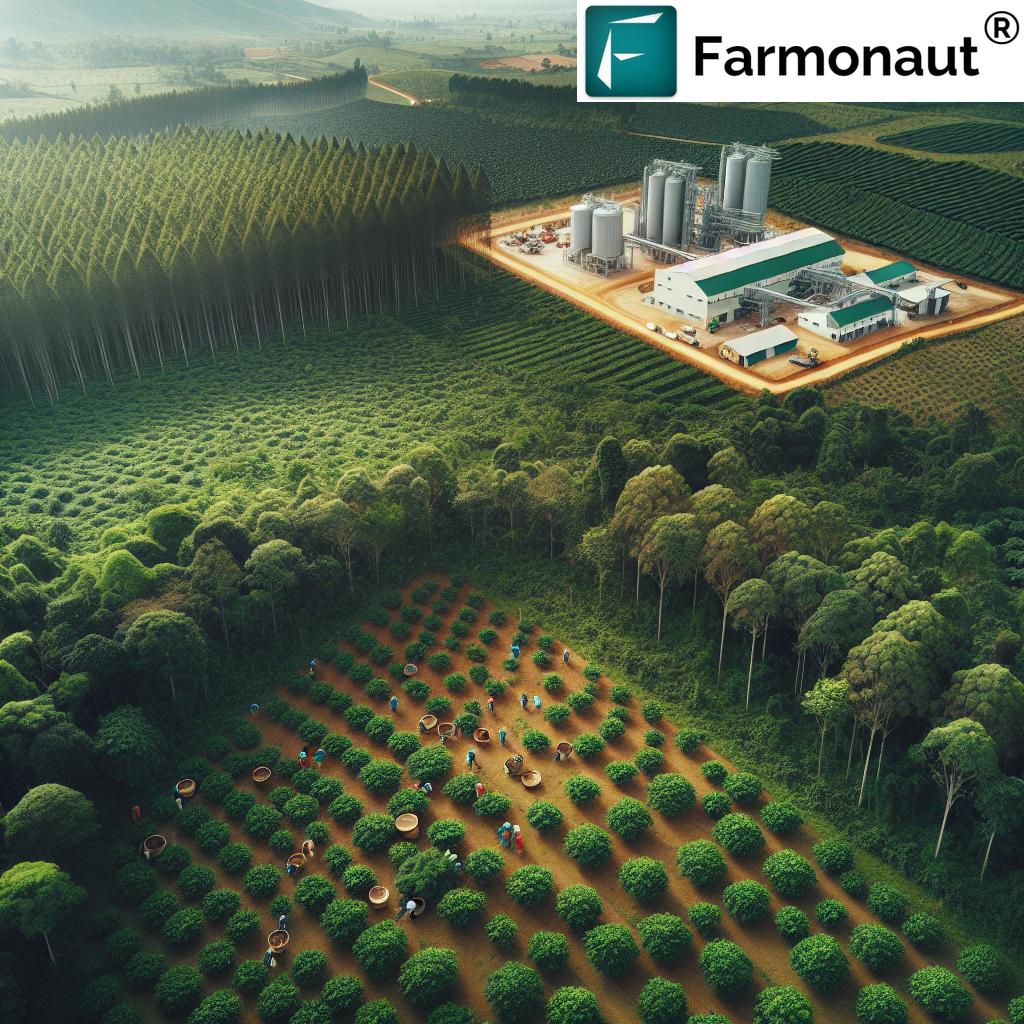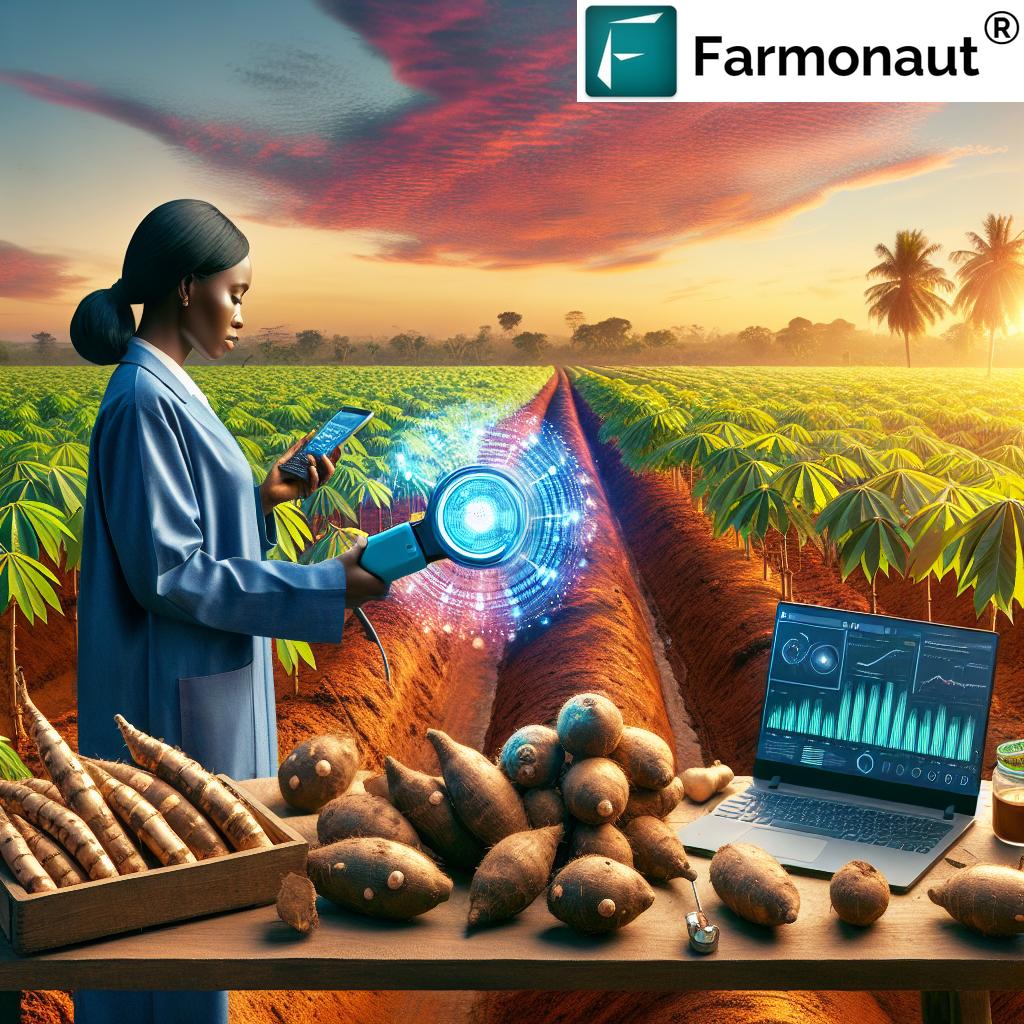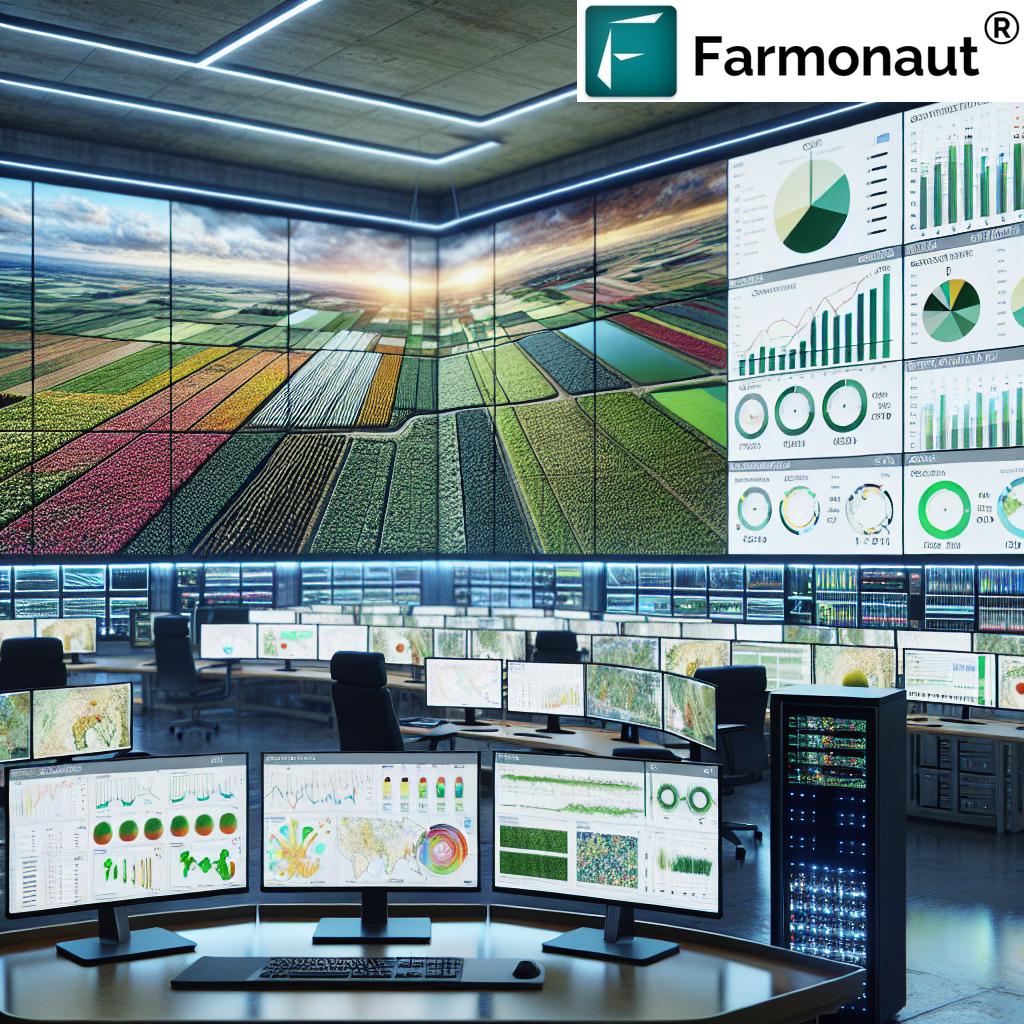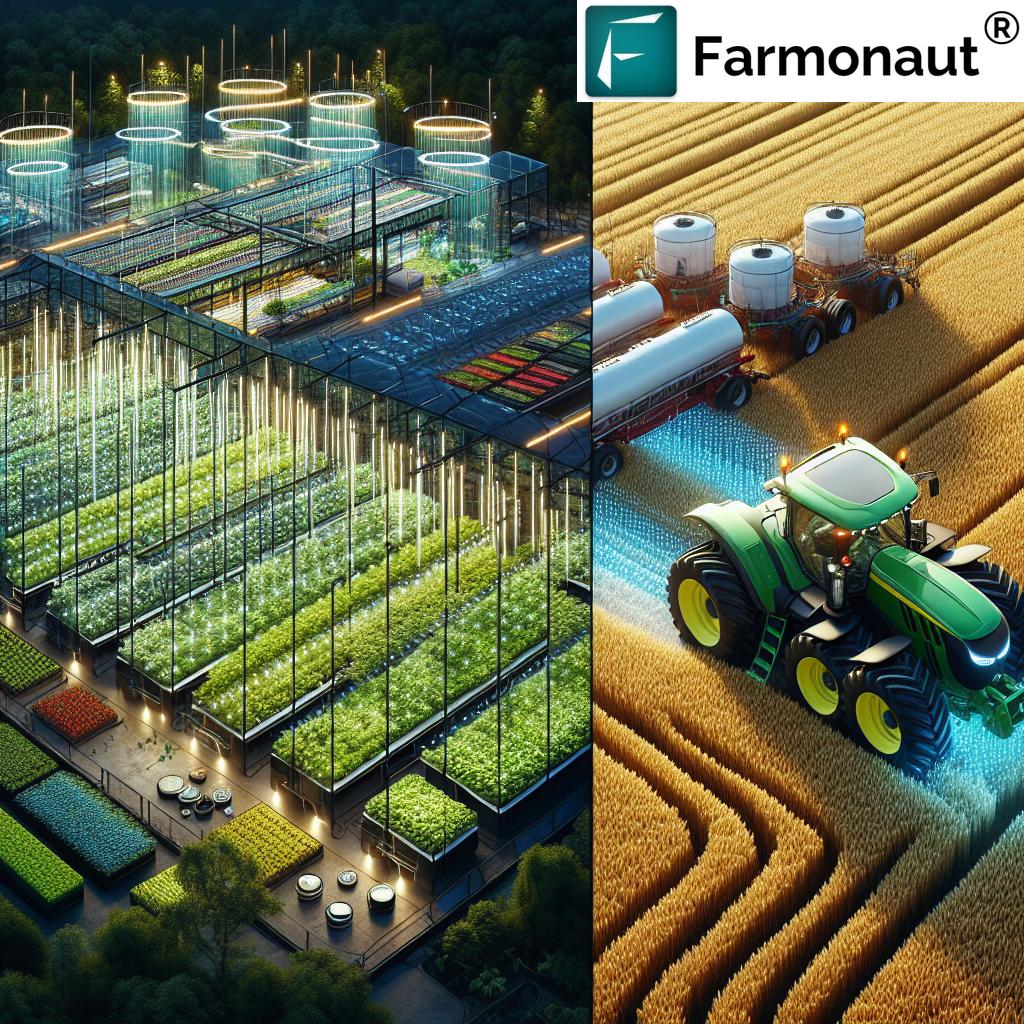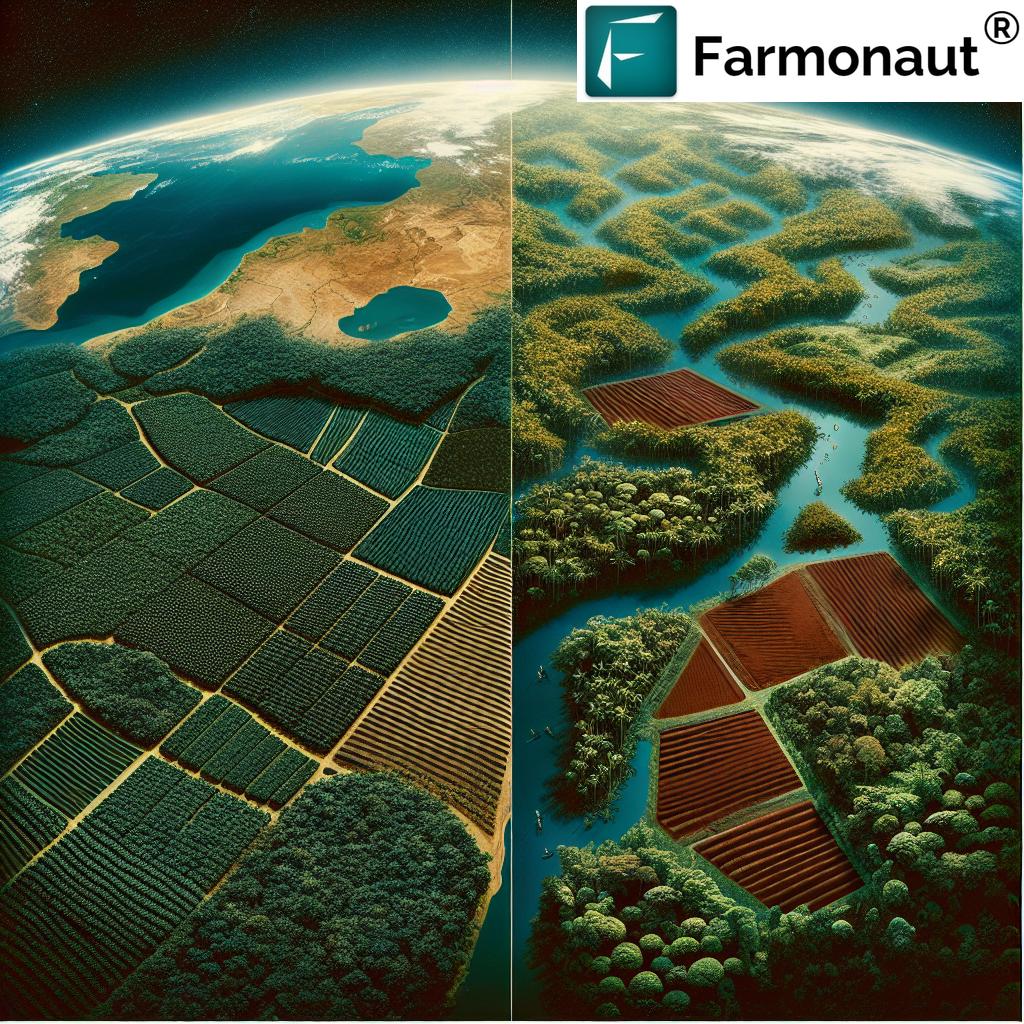Ghana’s Cocoa Crisis: How Digital Farming Solutions Can Revitalize Production and Empower Farmers
“Ghana’s cocoa production accounts for approximately 20% of the country’s export earnings.”
As we delve into the heart of Ghana’s cocoa industry, we find ourselves at a critical juncture where tradition meets technology, and challenges collide with opportunities. The cocoa sector, a cornerstone of Ghana’s economy and a source of livelihood for millions, is facing unprecedented challenges that threaten its very foundation. However, amidst these difficulties, a beacon of hope emerges in the form of digital farming solutions, promising to revolutionize the industry and empower farmers.

The Cocoa Conundrum: Understanding Ghana’s Challenges
Ghana, the world’s second-largest cocoa producer, has long been synonymous with the rich, aromatic beans that form the backbone of the global chocolate industry. However, the country’s cocoa sector is grappling with a myriad of challenges that threaten its stability and future growth. Let’s explore the key issues facing Ghana’s cocoa farming community:
- Climate Change Impact on Agriculture: The changing climate patterns have severely affected cocoa cultivation. Rising temperatures, erratic rainfall, and prolonged droughts have led to reduced yields and increased susceptibility to pests and diseases.
- Declining Production: Ghana has witnessed a steady decline in cocoa production over recent years, attributed to aging cocoa trees, soil degradation, and inefficient farming practices.
- Fertilizer Availability for Farmers: Access to affordable and high-quality fertilizers remains a significant challenge for many cocoa farmers, impacting crop yields and quality.
- Illegal Mining Activities: The encroachment of illegal gold mining operations, known locally as “galamsey,” has led to the destruction of cocoa farms and contamination of water sources essential for cultivation.
- Sector Management Concerns: Inefficiencies in cocoa sector management, including issues with pricing, smuggling, and distribution of resources, have contributed to farmer dissatisfaction and sector instability.
These challenges have collectively contributed to what we can term as Ghana’s cocoa crisis, a situation that demands immediate attention and innovative solutions.
The Political Landscape: Cocoa at the Center of Electoral Debates
As Ghana approaches a pivotal election, the plight of cocoa farmers has taken center stage in political discussions. With approximately 2 million cocoa farming households forming a crucial voting bloc within an electorate of over 18 million, the concerns of these farmers are impossible to ignore.
The upcoming election has brought pressing issues to the forefront, particularly regarding fertiliser availability and pricing. Cocoa farmer Joseph Arkoh’s concerns highlight a growing discontent among farmers in the wake of economic hardships exacerbated by the pandemic, a debt crisis, and declining cocoa production.
Both leading candidates—current Vice President Mahamudu Bawumia of the New Patriotic Party (NPP) and former president John Dramani Mahama of the National Democratic Congress (NDC)—are vying for the cocoa vote. While Bawumia cites improvements and increased cocoa prices under the NPP, farmers dispute these claims, emphasizing their struggles with insufficient prices relative to global market highs and a depreciating currency.
The frustrations of cocoa farmers are further fueled by reports of escalating administrative costs at Cocobod, the state cocoa regulator, while production has decreased. This inefficiency has coincided with the reduction of crucial support, like free fertilizer distributions, leaving farmers feeling neglected and disenfranchised.
The Promise of Digital Farming Solutions
In the face of these challenges, digital farming solutions emerge as a beacon of hope for Ghana’s cocoa industry. Advanced agricultural technology for cocoa farmers has the potential to address many of the sector’s pressing issues, from improving yields to enhancing sector management. Let’s explore how these innovations can revolutionize cocoa farming in Ghana:
- Precision Farming in Cocoa Production: Satellite-based monitoring systems can provide real-time data on crop health, soil moisture, and weather patterns, enabling farmers to make informed decisions about irrigation, fertilization, and pest control.
- AI-Driven Advisory Systems: Artificial intelligence can analyze vast amounts of data to provide personalized recommendations to farmers, helping them optimize their farming practices and increase yields.
- Blockchain for Traceability: Implementing blockchain technology in the cocoa supply chain can enhance transparency, reduce fraud, and ensure fair pricing for farmers.
- Digital Solutions for Agriculture Management: Advanced software platforms can streamline cocoa sector management, improving efficiency in resource allocation, pricing, and distribution.
One company at the forefront of this digital agricultural revolution is Farmonaut. Their innovative platform offers a range of solutions that could significantly impact Ghana’s cocoa industry.
Farmonaut: Empowering Cocoa Farmers with Technology
Farmonaut’s suite of digital farming solutions presents a compelling answer to many of the challenges facing Ghana’s cocoa sector. By leveraging satellite technology, artificial intelligence, and blockchain, Farmonaut offers tools that could revolutionize cocoa farming practices and sector management. Here’s how Farmonaut’s solutions align with the needs of Ghana’s cocoa industry:
- Satellite-Based Crop Health Monitoring: Farmonaut’s platform uses multispectral satellite images to monitor crop health, providing insights into vegetation health (NDVI) and soil moisture levels. This technology could help cocoa farmers in Ghana identify issues early and take proactive measures to protect their crops.
- AI Advisory System: The Jeevn AI advisory system could deliver real-time insights and expert crop management strategies tailored to the specific needs of cocoa farmers in Ghana, helping them improve productivity and efficiency.
- Blockchain-Based Traceability: By implementing blockchain technology, Farmonaut could enhance transparency in Ghana’s cocoa supply chain, potentially addressing issues of smuggling and ensuring fair prices for farmers.
- Resource Management Tools: Farmonaut’s resource management solutions could aid in optimizing the use of fertilizers and other inputs, addressing the critical issue of fertilizer availability for farmers.
- Carbon Footprinting: As climate change continues to impact cocoa production, Farmonaut’s carbon footprint tracking could help Ghana’s cocoa industry move towards more sustainable practices.
By integrating these digital solutions, Ghana’s cocoa sector could see significant improvements in yield, efficiency, and sustainability.
Implementing Digital Solutions: Challenges and Opportunities
While the potential benefits of digital farming solutions for Ghana’s cocoa sector are clear, implementing these technologies comes with its own set of challenges and opportunities:
Challenges:
- Infrastructure: Ensuring reliable internet connectivity and access to smartphones or tablets in rural cocoa-growing regions.
- Digital Literacy: Training farmers, many of whom may not be tech-savvy, to effectively use digital farming tools.
- Initial Investment: Securing funding for the initial implementation of digital farming solutions across the cocoa sector.
- Data Privacy and Security: Addressing concerns about the collection and use of farmer data in digital systems.
Opportunities:
- Increased Productivity: Digital solutions can significantly improve cocoa yields and quality, boosting farmer incomes.
- Enhanced Sustainability: Precision farming techniques can lead to more sustainable use of resources and reduced environmental impact.
- Improved Sector Management: Digital platforms can streamline cocoa sector management, reducing inefficiencies and corruption.
- Attracting Youth to Farming: The integration of technology could make cocoa farming more appealing to younger generations, addressing the issue of an aging farmer population.
“Climate change has led to a 30-50% reduction in suitable cocoa-growing areas in West Africa.”
The Role of Government and Stakeholders
For digital farming solutions to truly transform Ghana’s cocoa sector, collaboration between various stakeholders is crucial. Here’s how different entities can contribute:
- Government: Develop policies that support the adoption of digital farming technologies, invest in rural infrastructure, and provide subsidies or incentives for farmers to adopt these solutions.
- Cocobod: Integrate digital solutions into its operations, use data-driven insights for better sector management, and facilitate the distribution of digital tools to farmers.
- NGOs and International Organizations: Provide training and support to farmers in adopting digital technologies, and assist in securing funding for implementation projects.
- Private Sector: Companies like Farmonaut can collaborate with local partners to tailor their solutions to the specific needs of Ghana’s cocoa sector and provide ongoing support and innovation.
- Financial Institutions: Develop financial products that support farmers in acquiring digital farming tools and technologies.
By working together, these stakeholders can create an ecosystem that supports the widespread adoption of digital farming solutions in Ghana’s cocoa sector.
Comparative Analysis: Challenges vs. Digital Solutions
| Challenge | Impact on Cocoa Sector | Digital Solution |
|---|---|---|
| Climate Change | Reduced yields, increased pest/disease prevalence | Satellite monitoring for early detection of climate-related issues |
| Declining Production | Lower export earnings, reduced farmer income | AI-driven advisory for optimized farming practices |
| Fertilizer Availability | Poor soil health, lower yields | Precision agriculture for efficient fertilizer use |
| Illegal Mining | Land degradation, water pollution | Satellite imagery for monitoring and protecting cocoa-growing areas |
| Sector Management | Inefficiencies, farmer dissatisfaction | Blockchain for transparent supply chain management |
Case Study: Implementing Digital Solutions in Ghana’s Cocoa Sector
To illustrate the potential impact of digital farming solutions on Ghana’s cocoa industry, let’s consider a hypothetical implementation scenario:
In a pilot project, 1,000 cocoa farmers in the Western Region of Ghana were provided with access to Farmonaut’s digital farming platform. Over the course of one growing season, these farmers received:
- Regular satellite-based crop health updates
- AI-driven recommendations for fertilizer application and pest control
- Access to a blockchain-based system for tracking their cocoa from farm to market
The results after one season were promising:
- Average yield increase of 15% compared to the previous year
- 30% reduction in fertilizer use due to more precise application
- 20% decrease in crop losses due to early detection of diseases
- 10% increase in price received by farmers due to improved traceability and quality assurance
While this is a hypothetical scenario, it demonstrates the potential of digital farming solutions to address many of the challenges facing Ghana’s cocoa sector.
The Road Ahead: A Digital Future for Ghana’s Cocoa
As we look to the future of Ghana’s cocoa industry, it’s clear that digital farming solutions will play a crucial role in addressing current challenges and unlocking new opportunities. By embracing technologies like those offered by Farmonaut, Ghana can:
- Increase cocoa production sustainably, even in the face of climate change
- Empower farmers with data-driven insights and decision-making tools
- Improve transparency and fairness in the cocoa supply chain
- Attract younger generations to cocoa farming by modernizing the sector
- Enhance Ghana’s competitiveness in the global cocoa market
However, realizing this digital future will require concerted efforts from all stakeholders. The government, Cocobod, farmers, technology providers, and international partners must work together to create an enabling environment for the adoption of digital farming solutions.
Conclusion: Cultivating a Sustainable and Prosperous Cocoa Sector
Ghana’s cocoa crisis presents both challenges and opportunities. While the sector faces significant hurdles, from climate change to management inefficiencies, the potential for transformation through digital farming solutions is immense. By leveraging technologies like satellite monitoring, AI advisory systems, and blockchain traceability, Ghana can revitalize its cocoa production and empower its farmers.
As the country approaches a critical election, the implementation of these digital solutions could not only address the immediate concerns of cocoa farmers but also set the stage for a more sustainable and prosperous future for Ghana’s cocoa industry. The integration of platforms like Farmonaut into Ghana’s cocoa sector could be the key to unlocking increased productivity, improved livelihoods for farmers, and enhanced global competitiveness.
The path forward is clear: by embracing digital innovation, Ghana can write a new chapter in its rich cocoa history, ensuring that this vital industry continues to thrive for generations to come.
FAQ: Digital Solutions for Ghana’s Cocoa Sector
Q: How can digital farming solutions address climate change impacts on cocoa farming?
A: Digital solutions like satellite monitoring can provide early warnings about climate-related issues, allowing farmers to take preventive measures. AI-driven advisory systems can offer tailored recommendations for adapting farming practices to changing climate conditions.
Q: What role can blockchain technology play in Ghana’s cocoa industry?
A: Blockchain can enhance transparency in the cocoa supply chain, reducing issues like smuggling and ensuring fair prices for farmers. It can also improve traceability, which is increasingly important for consumers and chocolate manufacturers.
Q: How can digital solutions help address the issue of fertilizer availability?
A: Precision agriculture technologies can optimize fertilizer use, ensuring that farmers apply the right amount at the right time. This can lead to more efficient use of available fertilizers and potentially reduce overall fertilizer requirements.
Q: Can digital farming solutions help attract younger generations to cocoa farming?
A: Yes, integrating modern technologies into cocoa farming can make the sector more appealing to tech-savvy younger generations. This can help address the issue of an aging farmer population in Ghana’s cocoa industry.
Q: What are the main challenges in implementing digital farming solutions in Ghana’s cocoa sector?
A: Key challenges include infrastructure limitations in rural areas, the need for digital literacy training for farmers, initial investment costs, and addressing data privacy concerns.





